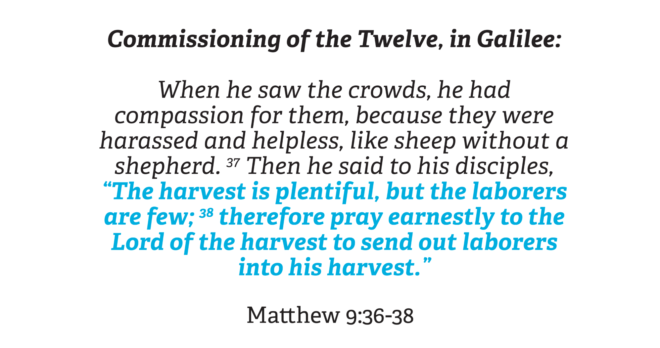Local Focus: Lead Your Church to Bloom Where It Was Planted 4th Essential for a Truly Evangelistic Church

A local church must not jump over the “Jerusalem” of Acts 1:8 to try to salve its congregational conscience by only supporting foreign missions. A church’s first and foremost responsibility is to “bloom where it was planted.”
Did you ever stop and think, “Why was my church planted where it was planted?” If you were to trace the history of your church back to its beginning, what would you find that motivated the men and women who took a step of faith to begin your church?

In many cases you would probably discover that someone or some group of people realized the community where your church was planted NEEDED a church—a lighthouse beaming the saving gospel of Jesus throughout the surrounding neighborhoods. Chances are—the need is still there, perhaps more than ever before.
Local Churches with Presbyopia
Presbyopia – It may not be a term that you are familiar with, but it’s a reality that all of us will eventually have to deal with, if we haven’t already. “Presbyopia is the normal loss of near focusing ability that occurs with age.”
Our loss of near focusing happens so gradually that we don’t know it’s gone until the results become so intolerable that we can’t go on without getting help.

I never needed glasses until my early adult years when I began to realize I was becoming only near-focused. I could read without glasses but couldn’t read the road signs. With the help from my optometrist and optician, the far-focus in my vision gradually improved. But now I can read road signs without glasses but, because of my aging eyes, I can’t read the book I’m holding in my hands or the computer screen right in front of me without something to help me with presbyopia.
Many evangelical churches that I’m familiar with have had a similar experience. They were planted because the founders clearly saw the need around them, but now their local focus has dimmed. Because they do have some commitment to the Great Commission, they have shifted their vision and focus on giving to support evangelism, discipleship, and church planting “over there.”
I know of non-North American “national” church leaders who have visited some of the churches in North America that support the missionaries who came to their country to teach them to evangelize, disciple, and plant churches. Often these church leaders from other countries are shocked and disappointed that the churches who sent missionaries to them are not practicing what they have sent missionaries to teach and practice.
Please don’t misunderstand me. I am very committed to international missions. For 25 years I have worked for an international mission board. I’ve had the privilege of teaching and training missionaries and national leaders in over 30 countries. My personal ministry would not have been possible without the faithful and sometimes sacrificial support of Christian families and local churches in North America. But a local church’s commitment to foreign missions should not become a cop-out for ignoring “doing missions” in the community where the church was planted.
Yes, Jesus said, “all the world,” and, “the whole creation,” in Mark 16:15. He said, “all nations,” in Matthew 28:19 and Luke 24:47. He said, “to the end of the earth,” in Acts 1:8. But, to clarify the expectations of this commission, He said:

In Chapter Two, I shared some thoughts about the “Harvester’s Prayer” in Matthew 9. The same prayer-exhortation also occurs in Luke 10 from another event in the ministry of Jesus.


Notice carefully: These were two different events in two different locations at two different times and recorded by two different apostles, but the need for harvesters and exhortations by Jesus were exactly the same—word for word in many English translations because the exact same Greek words were recorded by Matthew and Luke.
I’ve heard dozens of sermons on these passages, but—if I recall correctly—most, if not all, of them have been missionary sermons, challenging Christians to consider becoming missionaries to foreign fields. There’s nothing wrong with using these texts in that way, but here the focus was local for Jesus. He saw the crowds in Galilee, which moved Him to pray for harvesters. He sent disciples into towns and villages of Judea, realizing the need for more harvesters.
On another occasion, this time in Samaria, Jesus pointed His disciples to the ripe harvest fields all around them. In this instance, Jesus was telling His followers to ‘lift up their eyes’ to see those coming toward them from town whom the woman invited to come meet Jesus. Think “local focus!”

Your Church’s “Here:There” Ratio
The term “glocal” has become popular in recent years among economists, politicians, and even missiologists and church leaders. It means to simultaneously give appropriate attention to the “here” and the “there”—the local and the foreign. Think McDonalds, KFC, Coca Cola, Pizza Hut, Exxon & Shell & BP, not to mention tech companies like Apple, Microsoft, Google, etc.
How successful would McDonalds and Coca Cola be, if they didn’t balance the “here” and the “there”?
Jesus didn’t invent the term “glocal,” but he certainly endorsed the concept and commanded its implementation for the spread of the gospel.
There is no perfect survey instrument to determine how balanced your church’s “Here:There” ratio is. But it shouldn’t take you and your church’s leadership long to assess it well enough to know whether or not you are “blooming where you were planted.”
What percentage of your church’s programs are genuinely (genuinely!) focused on spreading the gospel to your local community?
It’s not all about money and the budget, but how much of your church’s budget is allocated to localevangelistic outreach?
What percentage, roughly speaking, of your church members are actively developing relationships locallywith unbelievers with a goal of presenting the gospel to them when they are open to receiving it?
How many lives of folks from your church’s local neighborhood are you seeing changed through the ministry of your church?
But you don’t know how difficult it is to evangelize in our area! You don’t understand that people where we are don’t want to hear about God, the Bible, or Jesus! Or: Everybody around our church has their own religion!
If we really thought those excuses were valid, we wouldn’t send missionaries to most parts of the world. But because the “gospel…is the power of God for salvation to everyone who believes,” there is no place too hard for the gospel not to work, when combined with planting, prayer, and patience—even where you live!
Renewing and Improving Your Church’s Local Focus
Are you concerned that your church seems to have lost its local focus? Are you concerned enough to take steps to regain or strengthen it? Many pastors and congregational members are concerned, even to point of near-desperation. We, at Good Soil Evangelism and Discipleship, often hear those pleas for help.
There is hope. Your church can regain its life-changing impact on the community in which your church was planted—it CAN bloom there again. That’s the reason for this book.
If the pastor is willing to lead the effort and he has rallied a core group of evangelistically interested members of the congregation who want to make the Great Commission the TRUE mission of the church, locally as well as internationally, there is definite hope, realistic hope.
The next step is to develop a strategy for reaching your “Jerusalem” the way Jesus intended and the way the early church responded. But a strategy must be customized—it must be localized for your church and your community. All we can do in these chapters is give you principles, tested and proven principles, upon which you can build your own local strategy.

Here’s a look back and a look forward to the entire set of articles in this “Twelve Essentials to a TRULY Evangelistic Church” series:
- Twelve Essentials: Overview
- The Evangelistic Pastor
- The E-Team
- THE Mission
- Local Focus
- Congregational Warmth
- Equipped Congregation
- Basic Discipleship
- Peer Accountability
- Evangelistic Praying
- Shared Rejoicing
- Strategic Simplicity
- Relentless Pursuit



